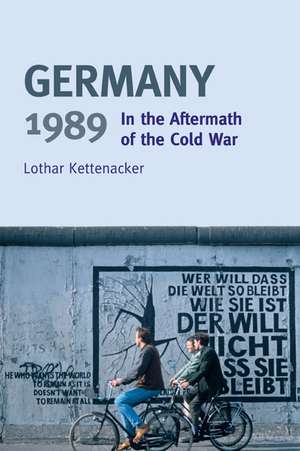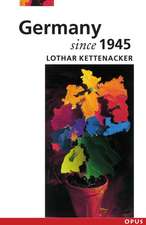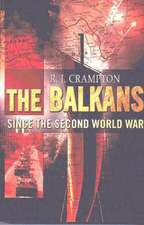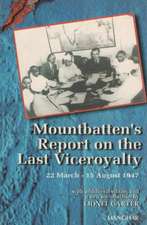Germany 1989: In the Aftermath of the Cold War: Turning Points
Autor Lothar Kettenackeren Limba Engleză Paperback – 25 iun 2009
Now, nearly twenty years later, it is possible to judge the causes and consequences of the revolution more clearly. Was the fall of the Berlin Wall an unexpected fluke, or was it, in fact, the result of a long process of engagement between East and West? And did the momentous events of 1989 really signal the start of a bright new future for a united Germany?
In this probing and wide-ranging account, Lothar Kettenacker considers the background behind the division of Germany and explains how the Berlin Wall and its death trap border proved to be the most horrendous manifestation of East-West antagonism. He also looks beyond 1990 to show how the confusion caused by the sudden collapse of the GDR and the fusion of two radically different economies is proving to be a challenge that will preoccupy Germany for generations to come.
| Toate formatele și edițiile | Preț | Express |
|---|---|---|
| Paperback (1) | 366.08 lei 6-8 săpt. | |
| Taylor & Francis – 25 iun 2009 | 366.08 lei 6-8 săpt. | |
| Hardback (1) | 1000.27 lei 6-8 săpt. | |
| Taylor & Francis – 26 apr 2017 | 1000.27 lei 6-8 săpt. |
Din seria Turning Points
-
 Preț: 47.66 lei
Preț: 47.66 lei -
 Preț: 370.63 lei
Preț: 370.63 lei -
 Preț: 51.68 lei
Preț: 51.68 lei -
 Preț: 186.31 lei
Preț: 186.31 lei -
 Preț: 97.50 lei
Preț: 97.50 lei -
 Preț: 86.84 lei
Preț: 86.84 lei -
 Preț: 381.72 lei
Preț: 381.72 lei -
 Preț: 169.74 lei
Preț: 169.74 lei -
 Preț: 352.51 lei
Preț: 352.51 lei -
 Preț: 446.53 lei
Preț: 446.53 lei -
 Preț: 475.16 lei
Preț: 475.16 lei -
 Preț: 436.14 lei
Preț: 436.14 lei -
 Preț: 441.95 lei
Preț: 441.95 lei -
 Preț: 280.86 lei
Preț: 280.86 lei -
 Preț: 89.32 lei
Preț: 89.32 lei -
 Preț: 123.94 lei
Preț: 123.94 lei -
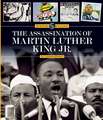 Preț: 91.23 lei
Preț: 91.23 lei -
 Preț: 307.60 lei
Preț: 307.60 lei -
 Preț: 306.48 lei
Preț: 306.48 lei -
 Preț: 306.48 lei
Preț: 306.48 lei - 20%
 Preț: 213.07 lei
Preț: 213.07 lei
Preț: 366.08 lei
Nou
Puncte Express: 549
Preț estimativ în valută:
70.05€ • 73.34$ • 58.10£
70.05€ • 73.34$ • 58.10£
Carte tipărită la comandă
Livrare economică 10-24 aprilie
Preluare comenzi: 021 569.72.76
Specificații
ISBN-13: 9780582418974
ISBN-10: 0582418976
Pagini: 288
Dimensiuni: 156 x 234 x 18 mm
Greutate: 0.68 kg
Ediția:1
Editura: Taylor & Francis
Colecția Routledge
Seria Turning Points
Locul publicării:Oxford, United Kingdom
ISBN-10: 0582418976
Pagini: 288
Dimensiuni: 156 x 234 x 18 mm
Greutate: 0.68 kg
Ediția:1
Editura: Taylor & Francis
Colecția Routledge
Seria Turning Points
Locul publicării:Oxford, United Kingdom
Public țintă
Postgraduate and UndergraduateCuprins
Introduction. I. Division through Zoning. II. Cold War Confrontation. III. Ostpolitik: Putting the East at Ease. IV. A Precarious Relationship. V. The People’s Revolution. VI. The Diplomatic Process. VII. An Expensive Take-Over Business. VIII. The Long Hangover. IX. A Crisis of Identity. X. Attempts at Explanation. APPENDIX. 1. Select Bibliography. 2. Chronology. 3. (Charts). 4. (Cartoons).
Notă biografică
Lothar Kettenacker studied in Frankfurt, Munich and Oxford before spending most of his career in the UK, where he was Deputy Director of the German Historical Institute, London. His most recent book written in English is Germany Since 1945 (1997).
Recenzii
"Lothar Kettenacker’s story of the collapse of the German Democratic Republic in 1989 […] is by far the most satisfactory account I have read of the greatest change that occurred in the political landscape of the late-twentieth century. The author’s text is elegant, insightful, and sure-footed. The final, reflective chapter should give everyone prone to rush to early judgment of recent happenings some severe cause for pause. This is a lovely book."
Paul M. Kennedy, Dilworth Professor of History and Director of International Security Studies, Yale University
"This perceptive and highly readable account provides a much-needed historical context for the drama and discontents of German Reunification. It should find broad appeal among general readers and specialists alike."
Paul Betts, University of Sussex, UK
"Lucidly written and accessible, Lothar Kettenacker's book offers a vivid, informative and well-presented overview of the political and diplomatic history of German reunification."
Riccardo Bavaj, University of St. Andrews, UK
Paul M. Kennedy, Dilworth Professor of History and Director of International Security Studies, Yale University
"This perceptive and highly readable account provides a much-needed historical context for the drama and discontents of German Reunification. It should find broad appeal among general readers and specialists alike."
Paul Betts, University of Sussex, UK
"Lucidly written and accessible, Lothar Kettenacker's book offers a vivid, informative and well-presented overview of the political and diplomatic history of German reunification."
Riccardo Bavaj, University of St. Andrews, UK
Descriere
In this probing and wide-ranging account, Lothar Kettenacker considers the background behind the division of Germany and explains how the Berlin Wall and its death trap border proved to be the most horrendous manifestation of East-West antagonism. He also looks beyond 1990 to show how the confusion caused by the sudden collapse of the GDR and the fusion of two radically different economies is proving to be a challenge that will preoccupy Germany for generations to come.
